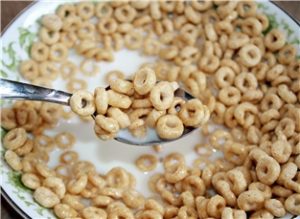Plague Journal, Losing My Mind
 Waking at 7AM this morning I felt particularly disoriented. By dint of habit I made my way to the stairs, then to the kitchen. At the counter I poured a bowl of Cheerios. I mechanically assembled the elements of breakfast ticking off the components in turn: two packets of splenda, gallon of milk, banana, spoon, etc. until seated, I tasted the first spoonful.
Waking at 7AM this morning I felt particularly disoriented. By dint of habit I made my way to the stairs, then to the kitchen. At the counter I poured a bowl of Cheerios. I mechanically assembled the elements of breakfast ticking off the components in turn: two packets of splenda, gallon of milk, banana, spoon, etc. until seated, I tasted the first spoonful.
The sky was lightening outside, appearing normal to my cursory scan of the backyard. Trees, shrubs, vegetation in a winter state of sleep — quiet, unperturbed, waiting indefinitely for a terminally delayed event, something that will occur, but not yet. It is obvious that even a view of the yard in the soft morning light is conditioned by the state of my mind.
That is how I feel these days, the regime of these mental atmospherics. I am wrung out by the exigencies imposed by a pandemic, restrictions upon travel, the unacceptable risk involved with being in the presence of friends. You know exactly what I am referring to. There is nothing that I can add to your own experience, nothing to say to lessen the pain, the damage to your well being entailed in these circumstances. We are social beings. Not only is life most pleasurable when it is shared, our sense of identity is sustained by the bonds of friendship, the normal exchange of good will when my smile and hello, is acknowledged by another’s smile and nod of recognition at the check-out register. Truncate those innumerable social exchanges by necessary, expression-blanking masks, and by social distancing, and by prohibition on gathering — emotional resilience erodes, day by day.
Looking over the The Morning overview of today’s contents of the New York Times I came upon this article The Pandemic’s Inhuman Demands. by columnist Michelle Goldberg. Here are a few of her vivid descriptions our our condition.
The strange politics of the coronavirus have created a taboo, at least in certain progressive circles, in talking too much about the emotional suffering wrought by nine months of purgatorial isolation.
Now that I’m waiting out a pandemic in a small apartment with small kids and winter closing in, most things I’d need to do to be less miserable are proscribed, though sometimes by suggestion rather than decree. In many cases, it’s up to each of us to decide how much seclusion, how much joylessness, how much boredom and frustration we can tolerate, even though the pandemic means that whatever risks we take for relief aren’t ours alone.
As Julia Marcus, an epidemiologist at Harvard Medical School, wrote in The Atlantic, “Americans have been told during this pandemic that taking any risks, no matter how carefully calculated, is a sign of bad character.”
My guess is that when this ends, many will start talking about the loopholes they found to avoid losing their minds. For now, as this hellish year reaches its end, solace and guilt are intertwined.